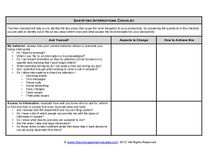Identifying Interruptions Checklist
 PDF
PDF
This Identifying Interruptions checklist guides enables you to discern how well you manage interruptions. By answering the questions in this checklist you are able to identify out of the six key areas which ones and what cause the most disruption to your productivity.
Interruptions are, unfortunately, part of the job when it comes to being a manager. There are always going to be unforeseen problems, unplanned intrusions, and moments where you are going to need to make time for things that you never intended to do. For some managers, however, this problem can seem very difficult to deal with. Of course, every business is a little bit different, and some teams of employees may be more prone to interrupting than others.
If you are a manager in an organization that seems to be plagued endlessly by interruptions that constantly set you behind, than you have likely experienced quite a bit of frustration as a result. Interruptions can definitely impede your day to day responsibilities, and can even keep you from completing the most essential tasks on your to-do list! So what can you do if you are constantly interrupted during the day? How can you learn to manage and contain such interruptions so that you can get done what YOU need to do? These are great questions, but it may please you to know that there are DEFINITELY options!
Recommended by Delegate
If employees constantly interrupt you to ask you questions related to a particular project or task, then you may be able to cut down on these instances by delegating authority to someone else. If you have a team member who you can trust to be 'in charge' of a project, then questions can be directed to them instead of you. This is a great way to cut down on interruptions that happen just because a decision needs to be made, and can be a great way to create more time for yourself during the day.
Create And Display Policies For Common Questions
If you regularly get the same types of questions and find yourself redundantly delivering the same information again and again, you can drastically reduce these instances by putting together and publishing a list of policies dealing with such a situation. If you ensure that every one of your team members knows the policies and can access them when needed, then you will likely find that you can create a lot of time for other things by enabling them with the exact same answers that you would give them BEFORE such an incident occurs.
Plan For Them
Sometimes, as a manager, it can be easy to forget that part of the job is to be available for questions, and to be flexible enough to help with unforeseen problems. In other words, there is absolutely NO way to do away with all interruptions, so instead of trying to 'beat them', you may as well 'embrace them' by planning on them anyway! By scheduling time for unforeseen problems, you can reduce your stress level and also avoid falling behind as you take care of things that you didn't see coming.
Make A Plan That Works For You
The modern business manager generally feels as if they are bombarded with intrusions, emails, phone calls, text messages, meetings, etc., all day long! Sometimes it can seem never ending! However, it is important to remember that YOU are the only one who is going to care about what you have to get done. Therefore, making a plan that helps to isolate you from distractions and interruptions is up to you. You may try letting all calls go to Voicemail, or decide to only check your emails once per hour. Maybe, instead of attending meetings before noon, you can let everyone know that they can email you the details instead. There are a lot of possibilities, but not all of them will work for you. That is why it is so important that you take stock of what is costing you the most time, and make a plan that will help you to keep on track.
Remember That You Are Just One Person
Keep in mind that you can ONLY do so much! You are just one person. You can't run the entire company by yourself, so don't try to! Don't feel bad or feel like you are dropping the ball if you are constantly staying busy, but still fail to return a call in the first two minutes of receiving it. The bottom line is that you can only do so much! Stay busy, work hard, and do your best… but don't beat yourself up if you fall behind, and don't feel like you should be doing a better job if you are literally doing all that you can.
Download "Identifying Interruptions Checklist.pdf"



 PDF
PDF
 PDF
PDF
 PDF
PDF